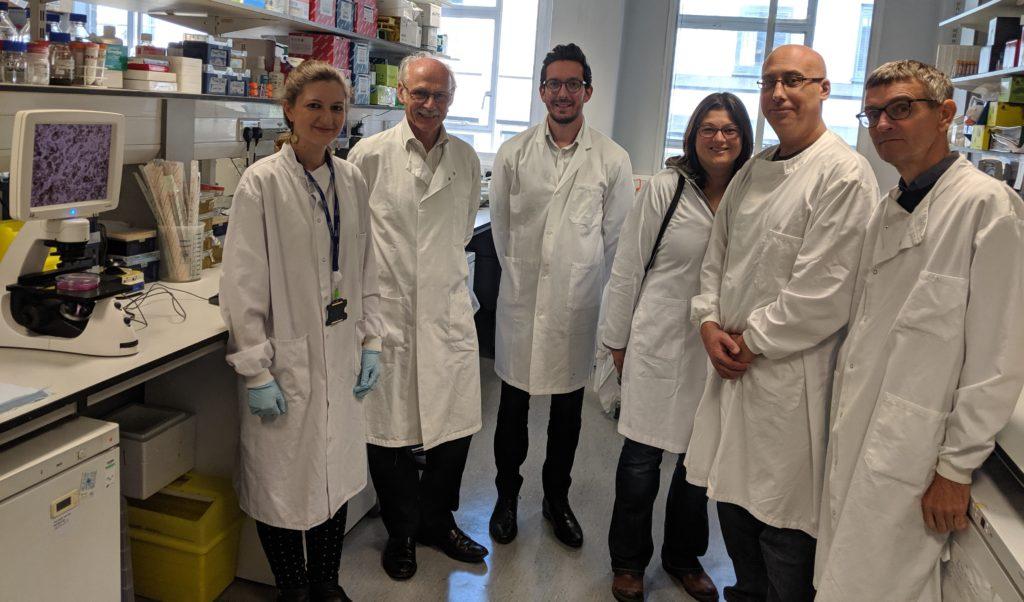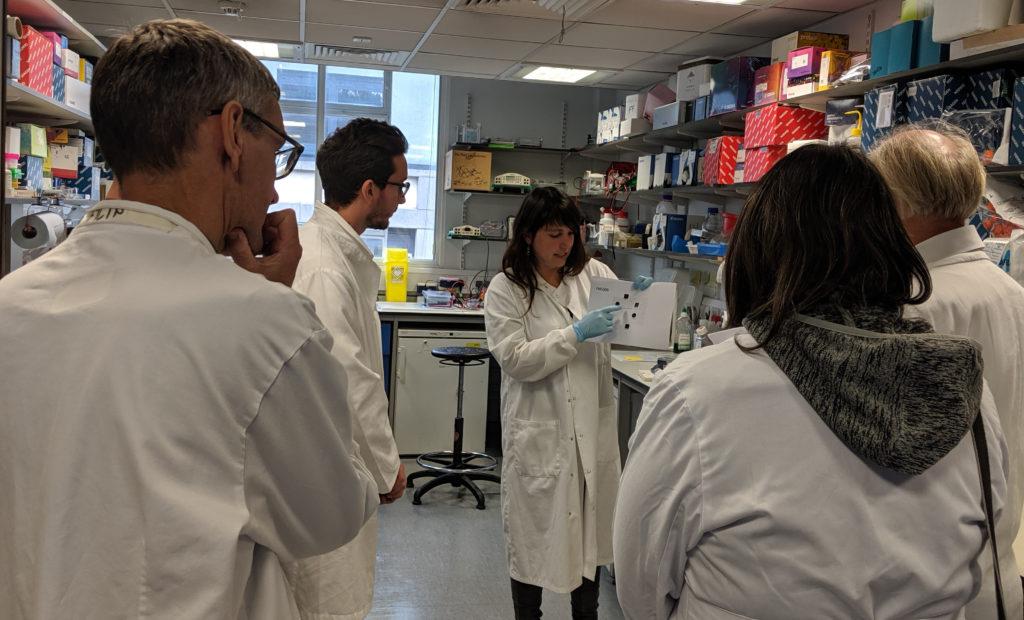Stepping behind the scenes: Bloodwise supporters visit the BCI

Last month, Barts Cancer Institute (BCI)’s Dr Bela Wrench hosted a session as part of the Bloodwise Lab Tour Programme, aimed at bringing current and potential supporters closer to research funded by the charity and to demonstrate the impact they can have in the fight against blood cancer.
As the UK’s leading blood cancer research charity, Bloodwise is one of the biggest supporters of BCI’s blood cancer research in its Centre for Haemato-Oncology, where the central aim is to understand the biology of blood cancers and harness this knowledge to identify new treatment strategies for patients.
A representative from Bloodwise said:
“Bloodwise are thrilled to be able to offer exclusive insights into the work undertaken by Bloodwise funded researchers. Lab Tours like this give us an opportunity to inspire and engage our network of supporters, bringing them closer to the organisation. Bloodwise are extremely grateful to Bela and the team for taking the time to give such fascinating presentations and showing us around the laboratory.”
To begin the day, attendees heard from researchers whose projects are supported by Bloodwise, including Dr Wrench, Professor Jude Fitzgibbon, Professor Kamil Kranc, Dr Jeff Davies and Dr Andrejs Braun, before heading to the laboratory to see first-hand what their research groups are working on.
We spoke with attendees Gillian and George, Bloodwise Patient Ambassadors, about their experience of the day. Gillian said:
“As members of Bloodwise’s Patient Ambassador Programme, George and I were delighted to take part in a tour of the Centre for Haemato-Oncology at the BCI. As blood cancer patients, we have both benefitted from treatments based on the type of cutting-edge research carried out at the Centre, and it was a great opportunity to see how the funds raised by supporters of Bloodwise were being put to great use in shaping the future of blood cancer research.”
Seeing science in action

Dr Ana Rio-Machin, a postdoctoral researcher in Professor Fitzgibbon’s group, is studying leukaemia - a type of blood cancer where the patients present an abnormal growth of white blood cells. The majority of leukaemia cases are sporadic (occur at random); however, Ana is looking at familial leukaemia where two or more family members are affected by the cancer due to the inheritance of a genetic error (mutation). Familial leukaemia accounts for around 5% of leukaemia cases and is often more aggressive than sporadic cases, presenting at an earlier age. In Ana’s project, she aims to detect the inherited genetic error in family members so cancer development can be detected and treated earlier. In the laboratory tour, visitors saw how to visualize and separate DNA fragments that can later be sequenced to identify the genetic error that is passed from parents to children in familial leukaemia.
Dr Wrench’s group works on the interaction of leukaemic cells with the bone marrow microenvironment, with the ultimate goal of their work being the identification of novel therapeutic strategies against disease relapse. Dr Chrysi Xintaropoulou, a postdoctoral researcher in Dr Wrench’s group, showed the attendees key models of their research under the microscope, where they were able to see leukaemic cells and adipocytes (key cellular components of the bone marrow microenvironment).
Dr Braun’s group is focused on the mechanisms that regulate a protein called Lamin B1 in cancer cells. Reduction in the level of Lamin B1 is associated with poor overall survival in patients with some types of blood cancer. The group are therefore working to better understand the mechanisms underlying Lamin B1 dynamics in the hope of identifying new drug targets to help improve the outcomes for patients. During the laboratory tour, Dr Marta Crespi Sallan, a postdoctoral researcher in Dr Braun’s group, showed the visitors how Lamin B1 levels are reduced in a type of blood cancer called Burkitt lymphoma by visualising cancer cells under a fluorescent microscope.

Speaking of the day, Dr Wrench said:
“Today has been a demonstration of our critical mass and collective effort in advancing our understanding of blood cancer and how this could impact improvements in treatment.”
Bloodwise Ambassador, George said:
“After relapsing, I'd struggled to regain remission via standard chemotherapy, so this couldn't have been more pertinent. It was emotional but hugely inspiring to learn about research with such exciting potential to save the lives of people like me."
Gillian added:
“To actually be able to discuss current projects, up to date results and next steps with the talented staff who are carrying out this important research was a remarkable experience. All who attended the lab tours felt privileged to meet this dedicated group of scientists who not only explained complex ideas with clarity, but who were willing to answer as many questions as we could fire at them! An unforgettable experience - thank you Bloodwise, and thank you to all at the Centre for Haemato-Oncology at BCI!”
Thank you to Bloodwise for your continued and vital support of our blood cancer research. To find out more about our blood cancer research, click here.
Category: Engagement, General News

No comments yet